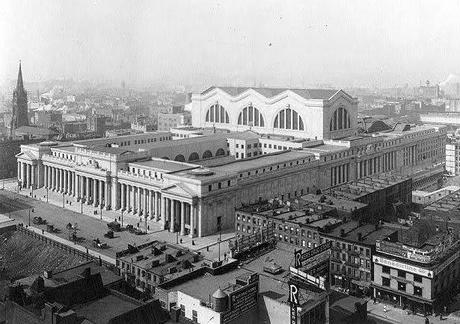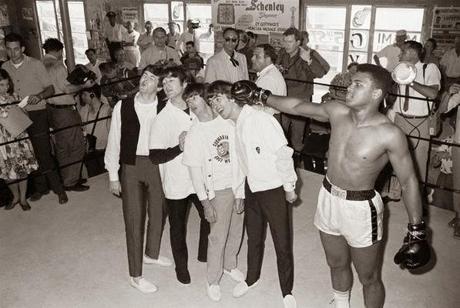 Prior to 1910, Manhattan was completely isolated from rail traffic, and all commuters and cargo had to make to their way to the isle by way of ferry. It was the vision of Pennsylvania Railroad President Alexander Cassatt to not only construct a tunnel system under the East and Hudson Rivers, but also to erect a grandiose terminal modeled after the Roman Baths of Caracalla. Cassatt did not live to see his dream realized, and the glorious station only stood for just over a century when the railroad company fell on harsh times and sold it off in 1963 to make way for Madison Square Garden.
Prior to 1910, Manhattan was completely isolated from rail traffic, and all commuters and cargo had to make to their way to the isle by way of ferry. It was the vision of Pennsylvania Railroad President Alexander Cassatt to not only construct a tunnel system under the East and Hudson Rivers, but also to erect a grandiose terminal modeled after the Roman Baths of Caracalla. Cassatt did not live to see his dream realized, and the glorious station only stood for just over a century when the railroad company fell on harsh times and sold it off in 1963 to make way for Madison Square Garden.

A year after demolition began on Penn Station was the year where slowly evolving and sharply opposing agendas came to a head in America: The Beatles appeared on Ed Sullivan. Cassius Clay beat Sonny Liston and changed his name to Muhammed Ali. Goldwater Republicans sounded the return of the Conservative movement while student demonstrators at Berkeley essentially kicked off the protest movement. The Civil Rights movement, with factions led by Martin Luther King and Malcolm X, fractured, people of all creeds and colors joined in the Freedom Rides, and the nation was shocked and inflamed following the murder of three of their members. In short, things would never be the same.
The Rise and Fall of Penn Station and 1964, two recent entries in PBS's American Experience program share very little in common, one a focused. clearly defined documentation, the other much more generalized, and both demonstrating the series at both its best and worst. Penn Station contains remarkable footage of both the massive construction and somewhat tragic demolition of the resplendent structure, is informative and even fascinating on some levels, and features knowledgeable commentators representing their specific field. 1964 is segmented and all over the place, containing a few intriguing sections but mostly covering widely known information, a lot of which has been done to death by the program itself. I did enjoy hearing from contributors who actually lived through the events.

